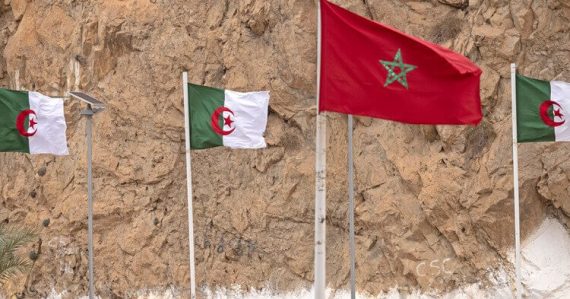It goes without saying that nothing is going well between Morocco and Algeria. Everyone is convinced that relations between the two major Maghreb countries have reached a point of no return, and observers are on the lookout for the slightest incident on the ground that could trigger a dramatic acceleration in tension and give rise to a dramatic exodus to Europe much more consistent than the current one.
In the very recent past, experts predicted that the possibility of an armed conflict was improbable, as the two heads of state risked losing more than just a war but instead control over their respective institutions. Now, nobody would bet a single penny on what might happen in the near or distant future.
The facts are there. Algeria, the most over-armed country in North Africa, continues to buy its weapons from abroad; from the Russians, of course, but for some time now it has been taking care to diversify its equipment. And Morocco is still counting on its long-standing ally, the United States, to equip and modernize its army – and with a bonus: following its normalization with Israel, the kingdom has signed several agreements with the latter to manufacture weapons on Moroccan soil.
In this frenetic arms race, anything can happen, otherwise, what is the point of depriving the Moroccan and Algerian populations of these vital financial resources that could be put to good use in preparing for war?
If we want to differentiate between the two countries, we can roughly say that Morocco is a monarchy with a liberal economy, and Algeria is a republic that has long been considered “socialist.” Otherwise, there aren’t many major differences between the two neighbors. The inhabitants speak the same vernacular (Darija) and use Berber languages that are very similar and have the same matrix. Similarly, classical Arabic is the official language in both countries, and French is the idiom of the elite.
Betrayal?
As for the economy, while Algeria’s resources are infinitely greater than Morocco’s, the kingdom has know-how in several key sectors that it has always drawn on to maintain its close relations with the West.
The black spot is in the tumultuous Morocco-Algerian relations. There are several factors, a huge abscess, a mess of mutual reproaches, desires for revenge, and a good dose of hatred that has become structural.
Without looking back too far, we can say that the tension that the Maghreb is experiencing today is not new and not the result of spontaneous generation. Relations between the two countries bear a heavy historical burden. Some Algerian historians go back as far as the 19th century to look for the source of this legendary enmity between the two enemy brothers that geographical proximity and a semblance of shared history could have reconciled.
According to them, it all started with a “betrayal” that took place after the battle of Isly on August 14, 1844, which pitted the army of the Alawite Sultan Abderrahmane Ben Hicham against that of the French General Thomas Robert Bugeaud. The defeat of the sultan’s mehalla (army) sealed the end of the Moroccan protection enjoyed by Emir Abdelkader, the leader of the Algerian resistance, and above all outlawed him throughout the territory of the Cherifian Empire, which had served as his refuge.
Though “betrayal,” according to some studious Algerians, is the term used to describe this inglorious event, Moroccan counterparts describe it as the inevitable consequence of the catastrophic defeat of the sultan’s mehalla (army) at Isly. Without this painful outlawing, Morocco risked a repeat of the French naval bombardments that destroyed part of the ports of Mogador (Essaouira) and Tangiers.
A history of mistrust
But this episode is not the only example that explains the Algerian mistrust of the Moroccan regime. Algerian academics have come up with a theory for the hijacking of an Air-Atlas-Air Maroc plane by the French air force on October 22, 1956, at the height of the Algerian war for independence. On board this aircraft, chartered by Sultan Muhammad V and flying from Rabat to Tunis, were the cream of the staff of the National Liberation Front (FLN).
Did Prince Hassan (and future King Hassan II) inform the French of the presence of Algerian officials on this flight, as some have Algerians accused? There is no historical consensus on this question and the French archives remain, for the moment at least, silent on the subject. It should be kept in mind that in 1956, Morocco had barely regained its independence for a few months, that the administration was under the control of the former protecting power, and that the French armed forces, including the air force, had not yet left Moroccan territory. Did France really need Prince Hassan to learn which flight the leaders of the Algerian rebellion were on?
The other major Algerian grievance, perhaps the most nagging, concerns the Sables War of 1963-1964, a territorial conflict that pitted the two North African armies against each other. The Algerians have not forgotten their humiliating defeat at the hands of a much better-prepared Moroccan army. They blame their losses in men and materials on the unpreparedness of their army, only one year after their independence. Hence the use, once again, of the word “treason” and the expression “stab in the back” by the Algerian side when recalling this fratricidal war.
The Moroccans, for their part, often reproach the Algerians for their perennial ingratitude. They accuse them of wilfully forgetting that the kingdom was resolutely on their side during the war of liberation against the French and that President Houari Boumediene expelled 45,000 Moroccan families by force in 1975. This is an old community that has lived in Algeria since the French era, some of its members since the 19th century, and which in many cases no longer had any connection with the country of their ancestors.
Algeria’s support for the Polisario
The other major criticism leveled by Morocco targets Algeria’s massive political, diplomatic, and even military support for the Sahrawi independence fighters of the Polisario Front from the outset of the war in Western Sahara in the mid-1970s. In fact, it was during this war that we came very close to a full-scale conflict between the two Maghreb powers. There were two specific dates. The first was the first battle of Amgala, in January 1976, which saw a direct military engagement by Algeria inside the territory of Western Sahara.
This military confrontation, the first since the Sands War, ended in a Moroccan victory. But a few weeks later, in February of the same year, another armed clash pitted the Moroccans against Polisario Front fighters, supported militarily by the Algerian army. It ended in victory for the Sahrawi independence fighters. It is thought that without the restraint of Hassan II and Houari Boumediene, the consequences of these two bitter and cruel battles would have given rise to a major conflict in the region.
The last time Morocco reproached Algeria was in 1994. That year, French terrorists of Algerian and Moroccan origin targeted places they considered symbolic of the kingdom’s image. These included a Jewish cemetery and, above all, the Atlas Asni hotel in Marrakech, where they murdered two Spanish tourists. Morocco accused the Algerian intelligence services of being behind this attack and closed the very long land border between the two countries. Since then, apart from a brief interlude, the border has remained closed.
This bitter enmity and mutual mistrust could have quietly gone on for several decades if things had not worsened recently.
Recommended
Iran and the Western Sahara
A few years ago, no doubt under the influence of Saudi Arabia and the Persian Gulf countries, Morocco began accusing Iran of involvement in the Western Sahara conflict. Rabat believes that the Republic of Iran asked its Lebanese armed wing, Hezbollah, to provide active military support to the Polisario Front in the Sahrawi refugee camps at Tindouf. And Tindouf necessarily means Algeria. With all due respect to the Moroccans, this accusation has never been proven. Neither by Rabat nor by its American allies, even though they are vigilant when it comes to Iran and Hezbollah.
But this has not prevented Morocco from breaking off diplomatic relations with Teheran on several occasions. To this must be added Morocco’s clumsy diplomatic initiative at the UN to support the hypothetical independence of Kabylia, a Berber-speaking region of Algeria. This is heresy for Algiers, which retorted violently to this initiative by pointing out that there is no UN process open to deal with this issue, whereas this is indeed the case for the Western Sahara conflict.
The normalization of diplomatic relations between Morocco and Israel, especially the military agreements, has also turned the region upside down and awakened Algerian diplomacy, which had been dormant for ages due to stagnation at the top of the state, led at the time by the aging President Abdelaziz Bouteflika. From the outset, Algiers has regarded the presence of the Jewish state in the Maghreb as a major threat to its national security, especially when Israeli Foreign Minister Yair Lapid took advantage of his visit to Rabat to rebuke it.
That’s where we are today. An improvement in Morocco-Algerian relations is by no means on the agenda. On the other hand, the slightest armed incident between the two states could have incalculable consequences for the region.





